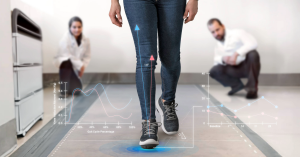AposHealth wins the 2025 Global Recognition Award for revolutionizing musculoskeletal care with Apos®, a drug-free, patient-centric solution for chronic pain
NEW YORK, NY, UNITED STATES, January 8, 2025 /EINPresswire.com/ -- AposHealth®, a global leader in non-invasive musculoskeletal treatments, has been honored with the 2025 Global Recognition Award for its groundbreaking innovation in musculoskeletal care.
The award celebrates AposHealth’s flagship solution, Apos®, a precision
medicine approach that transforms the way chronic knee osteoarthritis, hip, and lower back pain are managed.The Global Recognition Award underscores AposHealth’s commitment to sustainable healthcare delivery. Judged by an impartial panel using the Rasch model—a rigorous framework ensuring objective evaluation across industries—this recognition solidifies AposHealth’s position as a pioneer in advancing medical technology.
Revolutionizing Pain Management with Precision Medicine:
Apos® combines advanced biomechanical science with personalized treatment to address the symptoms of musculoskeletal pain and its root causes. By considering each patient's unique anatomy, biomechanics, neuromuscular responses, and medical history, Apos® delivers a targeted, patient-centric solution.
The proprietary Apos® system, including its personalized foot-worn medical device and treatment plan, offers a seamless, drug-free, and non-invasive approach to pain management.
1. Effortless Integration into Daily Life: The patient wears the Apos device only for up to one hour a day during everyday activities like walking, working, or running errands—no gym visits, special equipment, or time-consuming routines are required.
2. Simple as Wearing Glasses: The device is easy to use, eliminating the need for complex technology or apps and making it accessible to a wide range of patients.
3. Personalized Care: Apos® doesn’t just mask symptoms; it addresses the underlying issues, providing meaningful relief and quality of life.
4. Telemedicine and Accessibility: The advanced device design allows the care team to treat patients remotely, bringing professional care to the comfort of their homes.
Clinical and Economic Impact:
Apos® has treated over 150,000 patients globally and boasts impressive evidence with more than 70 clinical studies. Key findings include:
1. Pain Reduction: 70% average reduction in knee pain(1) and 56% reduction in lower back pain(2).
2. Surgical Avoidance: 89% of eligible total knee replacement patients avoid surgery for up to six years(3).
3. Medication Reduction: 61% decrease in pain medication use and an 85% reduction in opioid usage(4).
In addition to improving patient outcomes, Apos® delivers significant cost savings:
4. Healthcare Utilization: 43% reduction in services such as imaging, injections, and specialty visits(4).
5. ROI: Over 3:1 return on investment within the first year of implementation(4).
Apos® is FDA-cleared for knee osteoarthritis, FDA-registered for hip and lower back pain, CE-cleared, and recommended in several clinical guidelines.
“The robust patent portfolio protecting AposHealth's methodology is built on years of rigorous research in biomechanical science. Their innovation combines advanced medical technology with practical healthcare applications, creating sustainable, patient-centered treatment protocols. By reducing dependence on opioids and surgical interventions, AposHealth has established itself as a leader in sustainable healthcare, reflecting their commitment to enhancing quality of life through proven medical innovation.” - Global Recognition Awards Team.
For more information, visit www.aposhealth.com
Sources:
1. Reichenbach A, Felson DT, Hincapi CA, Heldner S, Butikofer L, Lenz A, da Costa BR, Bonel HM, Jones RK, Hawker GA, Juni P. Effect of Biomechanical Footwear on Knee Pain in People With Knee Osteoarthritis. The BIOTOK Randomized Clinical Trial. JAMA 2020;323(18):1802-1812.
2. Veeramachaneni R et al. Clinical outcomes of a new non-invasive biomechanical intervention for chronic low back pain patients. A Randomized Clinical Trial.
3. Benn, R., Rawson, L., & Phillips, A. (2023). Utilising a non-surgical intervention in the knee osteoarthritis care pathway: A 6-year retrospective audit on NHS patients. Therapeutic Advances in Musculoskeletal Disease. https://doi.org/10.1177/1759720X231187190 )
4. Josh Mark, Shirley Shema-Shiratzky, Joel Sommer, Tim Nolan, Ganit Segal. Reduction in Healthcare Resource Utilization Following Treatment With a Home-Based Footworn Device in Patients With Knee Osteoarthritis: A Retrospective Claims Analysis. J Health Econ Outcomes Res. 2024 May 16;11(1):134-140. doi: 10.36469/001c.117155.eCollection 2024. https://pubmed.ncbi.nlm.nih.gov/38765914/


No comments:
Post a Comment